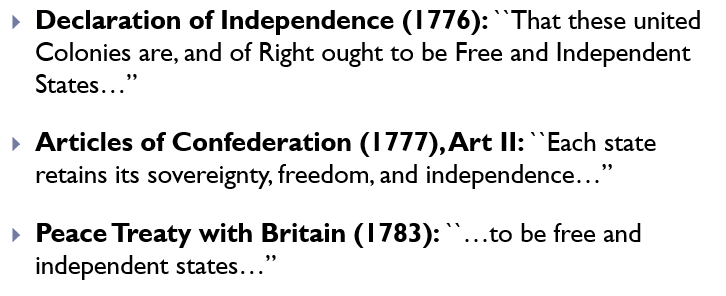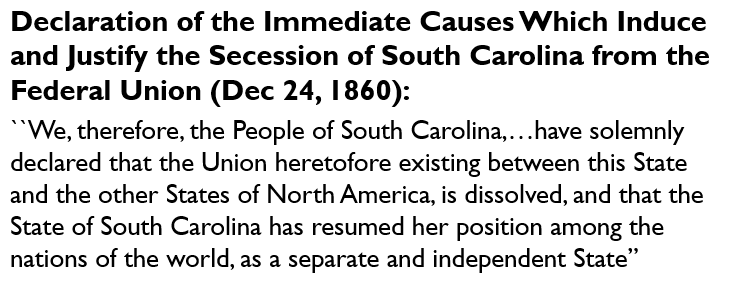What& #39;s going on?
Well, it illustrates why I describe the US Constitution as an "International Organization" in "Intro to International Relations"
[THREAD]
ICYMI, @GavinNewsom recently referred to California as a "nation-state" https://www.bloomberg.com/opinion/articles/2020-04-09/california-declares-independence-from-trump-s-coronavirus-plans">https://www.bloomberg.com/opinion/a...
This was a bit odd, because it& #39;s a phrase commonly reserved for sovereign members of the international system, namely the members of the United Nations
https://www.un.org/en/member-states/">https://www.un.org/en/member...
https://www.un.org/en/member-states/">https://www.un.org/en/member...
What came next was the "pact" b/w California, Washington, and Oregon https://twitter.com/GovInslee/status/1249777161549967360">https://twitter.com/GovInslee...
Followed by a similar "pact" of states in the Northeastern US https://twitter.com/QuickTake/status/1249777236632371204">https://twitter.com/QuickTake...
The purpose of these "pacts" is to coordinate state responses to #COVID19 and the restarting of state economies https://twitter.com/alfred_twu/status/1249789233146945536">https://twitter.com/alfred_tw...
In a sense, this is unsurprising. After all, governors have been taking the lead in responding to the crisis https://twitter.com/ProfPaulPoast/status/1248981064326012934">https://twitter.com/ProfPaulP...
But seeing states take so much control into their hands has surprised people. Moreover, it& #39;s frustrated @realDonaldTrump https://twitter.com/TwitterMoments/status/1249858667085574144">https://twitter.com/TwitterMo...
What this illustrates is a more fundamental point: when push comes to shove within the United States, the individual states have A LOT of control over their own policies.
That& #39;s the heart of Federalism, right?
That& #39;s the heart of Federalism, right?
Sometimes this is good, such as when states want to stop certain actions that produce "negative externalities" https://www.illinoispolicy.org/illinois-senate-committee-approves-statewide-plastic-bag-tax-exempts-chicago/">https://www.illinoispolicy.org/illinois-...
...and can enable states to pursue policies that undermine more widely held national principles (h/t @robmickey) #v=onepage&q&f=false">https://books.google.com/books?id=yqDwG2MBoNwC&printsec=frontcover&dq=Paths+out+of+dixie&hl=en&newbks=1&newbks_redir=0&sa=X&ved=2ahUKEwjyvseA4-foAhXRVs0KHSvOBp0Q6wEwAHoECAUQAQ #v=onepage&q&f=false">https://books.google.com/books...
Of course scholars of American Politics have studied Federalism extensively https://onlinelibrary.wiley.com/doi/full/10.1111/j.0092-5853.2005.00126.x?casa_token=4vl4ARmLGOAAAAAA%3A8QlCcbKcvqwy_Fw_vhPQIRI68WCUMXUdToeICanGwSZx872eP3p7XuIA24VQdLFJh5Fl4SZcWv5W9w">https://onlinelibrary.wiley.com/doi/full/...
And scholars love leveraging federalism to gain "causal identification" https://www.cambridge.org/core/journals/american-political-science-review/article/crossborder-spillover-us-gun-laws-and-violence-in-mexico/438E607A07F32D57AF244B61ED38FB28">https://www.cambridge.org/core/jour...
But US Federalism also useful for International Relations scholars.
This is primarily because the US Federal system is due to a process of keen interest to international relations scholars: when sovereign states choose to "delegate" authority to an international organization.
For an example of IR scholars exploring delegation to international organizations, see... https://link.springer.com/article/10.1007/s11558-014-9194-4">https://link.springer.com/article/1...
...or the variety of contributions here #v=onepage&q&f=false">https://books.google.com/books?hl=en&lr=&id=KTIbxACnMgYC&oi=fnd&pg=PP1&dq=delegation,+international+organization&ots=BpNARKS0df&sig=D81EZt4hQRCKPwnEvjEi_CIkFy4 #v=onepage&q&f=false">https://books.google.com/books...
More precisely, , recall that the 13 colonies became 13 sovereign states when they declared independence
But the independent states faced a host of cooperation problems, such as inability to effectively coordinate and pool resources to fund an effective navy #v=onepage&q=If%20we%20mean%20to%20be%20a%20commercial%20people&f=false">https://books.google.com/books?id=3DkX6Uo0gwIC&printsec=frontcover&source=gbs_ge_summary_r&cad=0 #v=onepage&q=If%20we%20mean%20to%20be%20a%20commercial%20people&f=false">https://books.google.com/books...
A way states address problems of cooperation (such as difficulty pooling resources) is to "design" an international organization. https://www.cambridge.org/core/journals/international-organization/article/rational-design-of-international-institutions/29B784E99033C7B3FC0564B96A64FE21">https://www.cambridge.org/core/jour...
In the words of Koremenos et al, the US Constitution is an international institution with a high level of "centralization" and low "member state control", at least, according to Article 10, for those things explicitly delegated to the national government
That the US is a good example of sovereign delegation to a supranational organization is why scholars have drawn direct comparisons between the US state system and the European Union.
See @rdanielkelemen...
http://fas-polisci.rutgers.edu/dkelemen/research/Kelemen_FederalismAndDemocratization.pdf">https://fas-polisci.rutgers.edu/dkelemen/...
See @rdanielkelemen...
http://fas-polisci.rutgers.edu/dkelemen/research/Kelemen_FederalismAndDemocratization.pdf">https://fas-polisci.rutgers.edu/dkelemen/...
.. or @ProfKMcNamara for a monetary system perspective https://docs.google.com/file/d/0B58Cgv2amVNcOUFQcmdYNkd5RFk/edit">https://docs.google.com/file/d/0B...
Of course, we are all very aware of the fragility of that union https://www.vox.com/2020/1/31/21087676/brexit-timeline-boris-johnson-whats-next">https://www.vox.com/2020/1/31...
In sum, conceptualizing the US Constitution as an International Organization makes clear why US states, faced with an IO failing to facilitate effective coordination and pooling, are now seeking to "regain some sovereignty" by forming alternative arrangements.
[END]
[END]

 Read on Twitter
Read on Twitter






